- Home
- Lou Cameron
Stringer and the Lost Tribe Page 6
Stringer and the Lost Tribe Read online
Page 6
He walked on to what was apparently the center of town. The company store had closed for the night, but the company saloon was still open. Stringer parted the batwing doors and went on in warily until he saw he and the barkeep seemed to have the place all to themselves. Stringer bellied up to the bar, ordered a beer, and tried to sound casual as he asked where everyone else was.
The barkeep filled a schooner for Stringer as he asked, “Where have you been? Didn’t they tell you about the funeral tonight?”
Stringer said, “I did hear something about a couple of old boys getting arrowed this afternoon. I can’t say they were pals of mine, though.”
The barkeep said, “I barely knowed ’em either. But if I wasn’t on duty I’d feel duty-bound to pay my last respects to fellow white men. They was a couple of sheriff’s deputies, sent over from Quincy by the county to give us a hand with the damned old Diggers. What am I supposed to do with this silver dollar, damn it?”
Stringer glanced down at the coin he’d placed on the fake mahogany between them. “I was hoping you’d give me some change back,” he said. “If beer costs more than a dollar a glass in this town, I may just join the WCTU.”
The barkeep explained, “Beer is a nickel a schooner here, in company scrip. I’m not supposed to deal in U.S. cash.”
Stringer smiled thinly. “I can see how paying folks real money could confuse their immigrant heads. But I don’t work here. Do you want me to puke back the couple of swallows I’ve already downed?”
The barkeep glanced around, confirming that this was a private conversation, then said, “That sounds messy. Suppose I just put this silver away and you drink moderate or slip me an extra quarter now and again should I ask you.”
Stringer said that sounded fair. He wasn’t surprised when the barkeep picked up the dollar and put it in his own pocket. He sipped some more suds before he said, “Correct me if I’m wrong, but I was just about sure that the county seat was Susanville. Ain’t Quincy the seat of Plumas county, to the south?”
The mining company man shrugged. “It could be. What difference does that make?”
“We’re in Lassen County, unsurveyed a part as this may be. The sheriff of Plumas County has no jurisdiction this far north. So why would he be sending deputies up here?”
The barkeep thought, then said, “All I know is that he did. Mayhaps the law ain’t all that picky when it comes to Indians. Us white men got to stick together, you know. Let me put another head on that beer afore the place fills up again.”
He did so as he either bragged or bitched, “This town ain’t four months old and we already got a graveyard started. Poor little Mary-Jo Crocker died just last month, and now we got them two poor old boys massacred by Indians. It just goes to show that even in life we’re in the midst of death.”
“I’m sorry about the gal. How did she die?”
“Death camas, according to the doc. She was only eight years old and must have thought she was picking wild onions. You should have seen her folks carry on. She was their only child, the poor little thing. I got to go to her funeral. She looked like she was asleep.”
Stringer drank some more beer and said soberly, “Death camas can have that effect. Are you saying that one kid and the two cusses they’re just planting make up the grand total of dead whites since this valley was settled by whites?”
The barkeep nodded but asked, “Hell, how many folk do you want to see dead in just four months? Are you some kind of homicidal lunatic?”
“Not hardly. But I was told you were having Indian trouble up here. Do you call one child getting into death camas an Indian uprising?”
The barkeep shot him an injured look and opined, “I surely do. We’ve had almost a dozen folk hit or at least grazed with arrows and twice that many scared skinny by their howling and hell-raising. They’ve busted windows and cut clotheslines and even tipped an outhouse over with an old woman sitting in it. The poor old gal come close to dying of fear and mortification. Them Diggers are mean as hell.”
“I was told you got some of them amid all the fussing,” said Stringer, one eyebrow cocked.
The barkeep smiled smugly. “That we did. Rifle shots carry a heap further than arrows. The boys nailed six or eight of the red rascals for sure. Some others they winged likely crawled off to die later in the chaparral.
None of ’em was buried in hallowed ground, though. You don’t have to bury Indians. If their kin don’t come for ’em after dark, the coyotes will.”
“So I’ve heard. But somebody told me your outfit was digging up Indians that had been dead a mite longer. Weren’t they interested in fresher specimens?”
The barkeep looked blank for a moment. Then he laughed. “Oh, that ain’t Consolidated Minerals. You’re talking about some scientific jaspers camped just outside the east end of town. They been collecting skulls for some museum back east. I can’t say whether they collected any recent Indian heads. Sounds sort of messy, if you ask me. One of ’em who drops by here now and again says they like old bones best. Don’t ask me why.”
Stringer promised he wouldn’t and asked if there was a Western Union office in town. The barkeep shook his head. “Nope. There’s a company wire to the outside, if the Diggers ain’t cut it again. It’s private, but you might ask, come morning. The telegraph set would be locked away for the night at this hour.”
Stringer finished his schooner, said he’d be back later for some more, and left. Even if the larcenous barkeep forgot the credit he still had coming on that cartwheel, Stringer felt a beer and a half was worth a whole dollar when you threw in the information he’d been served with it.
The street outside was more crowded now as the mine workers and their women drifted down from the hillside funeral service. Stringer knew he had plenty of time to ask where a stranger might bed down for the night. He wanted to talk to as many folks as he could before they went on home. He passed a smithy and some dark storefronts, and then, sure enough, he spied some tents up ahead, lit from inside. He saw a shapely shadow moving inside the nearest one. Then a female figure came outside to toss a pan of dishwater on the ground and let it run wherever it had a mind to.
Before she could turn away, Stringer hailed her and asked if she might know where the scientific expedition might be.
“You’ve found it. I’m Nancy Gore. My father is Dr. Gore of the California Institute of Anthropology. Father just turned in for the night after a hard day’s fieldwork. Is there anything I might do for you?”
As he got closer, Stringer saw there surely was. But he didn’t think the willowy ash blonde in riding breeches and a mighty thin silk blouse could have meant that the way he wished he could take it. He ticked the brim of his Rough Rider hat and said, “My name’s MacKail. I ride for the San Francisco Sun, ma’am. I was sent up here to do a feature on the local Indians, and, seeing you seem so interested in ’em…”
She smiled. “Heavens, Father isn’t interested in the miserable Diggers around here. His thesis is that a far superior race once inhabited these mountains. I don’t want to wake him up, but I’ll be happy to show you some of the things we’ve discovered, if you’ll follow me.”
He did. She looked pretty from that point of view as well. She led him into a darkened tent and struck a match to light the bright Coleman lantern. He was sort of sorry she’d done that as he stared soberly down at a trestle table covered with grinning skulls, stone tools, and bits of busted crockery. But she seemed to take pride in the collection as she told him, “A lot of the remains we’ve found seem to be recent, more debased types. But these prime specimens prove this valley was once inhabited by a handsome race with the brain capacity of superior whites. Have you ever seen such strong and graceful bone structure?”
“Yep. Indians don’t bury their dead as deep as we do. Some don’t bury ’em at all. How come you had to go to all this trouble to measure Indian skulls, ma’am? They got boxes and boxes of Indian bones in the Smithsonian back east. Nobody’s ever had time to meas
ure a tenth of ’em. Seems to me it would make as much sense, and upset the local Yana less, if you were to just work with bones cluttering every museum in the country.”
She shot him a superior look. “Don’t be silly. The extinct Yana were unique to these hills, and it could hardly upset any of them now.”
“You’re wrong,” he said flatly. “The Yana don’t know they’re extinct. They moved into this valley within living memory. So what you have here as a superior race are just Yana with bigger heads, dead no more than fifty or sixty years. The ones you seem to have dismissed as Diggers are just their smaller relatives—their relatives who are still alive and are mighty cross about your digging up any of their grandparents. They don’t feel half as scientific about grave robbing as we might.”
She sat on a crate as she insisted, “You surely must be joshing, Mr. MacKail. Look at those finely worked flint tools and well-fired potsherds. Then tell me they were buried with the remains of mere Diggers.”
He sat down on a nail keg to reply, “You can call me Stuart if I get to call you Nancy. I can see you don’t know much about Yana. To begin with, ‘mere diggers’ is sort of insulting. All the Sierra tribes dug for bulbs and edible roots. But the Yana are, not were, more advanced by far than the desert tribes to the east. I just heard tell of a white girl who dug bulbs in this same valley. She didn’t know as much about digging as your so-called Diggers. I just had supper this afternoon with some Yana. They had compound bows, and they were passing around a pipe with a bowl of well-carved and polished jasper. Those old skin scrapers and carving knives ain’t made of flint, by the way. They’re chert. Takes a good stone knapper to work chert. The Yana never were and still ain’t subhumans grubbing for roots. They’re hunter-gatherers, at least as advanced as the eastern woodland tribes, albeit more peaceable when left alone.”
She stared at him uncertainly and said, “That’s not the way the local Indians have been described to us by the whites up here, Stuart.”
To which he replied with a thin smile, “I know what the mining men who stole this valley say about the folks they robbed. It could spoil the taste of a mint julep if it occurred to you that the folks picking your cotton in the hot sun had human feelings. I’d best have a talk with your father in the morning, before he digs up any more dead Diggers. The Yana still knap mighty sharp arrowheads, and they’re mighty vexed about his search for a long-lost race that some of ’em still remember fondly.”
CHAPTER FIVE
The saloon was crowded when Stringer got back to it. The barkeep served him another beer without asking for company scrip or anything else. Then he must have mentioned Stringer to someone further down the bar, for a morose-looking trio of gents closed around him a few moments later.
The one in the rusty black suit with a mail-order badge pinned to its lapel said, “I’d be Clem Watson, town law for Consolidated Minerals. This other gent here would be my deputy. Young Saunders, with the Mex hat, would be a county deputy from Quincy. Who did you say you might be, stranger?”
MacKail put down his beer and said, “I’d be Stringer MacKail from the San Francisco Sun. I hope you’ll notice I’m reaching for my wallet with my left hand.”
Watson nodded, and Stringer got out his press pass and I.D. to show them. “I was sent up here to do a feature on the Great Yana Uprising. I hope it’s not a private fight.”
“We thought we’d about won until this afternoon,” Watson said. “Young Saunders here brung his fellow deputies in full of arrows. We told ’em to let sleeping dogs lie. But did they listen?”
Saunders seemed more interested in Stringer than in Indians as he hovered his gun hand near his tied-down Colt ’74 with a heap of thoughts running around in his sly gray eyes. He waited until Stringer was putting his wallet away before he went for his gun.
It wasn’t the best move he could have made. Stringer had been hoping he wouldn’t. But he’d half expected him to, so he beat the kid to the draw and put three rounds in his chest.
One would have done the job, he saw, as Saunders sprawled at their feet with his own gun half out and a sad little smile on his dead face. Everyone but the two remaining lawmen had taken cover. But as the gun-smoke drifted toward the doorway, Watson and his deputy were still there, with their own guns out. Watson said, “I’d say you just got yourself in one hell of a mess, old son. Give your gun to old Jimbo, and let’s talk about it. Do you make a habit of shooting deputy sheriffs?”
Stringer handed his still warm .38 to the one called Jimbo as he answered, “Nope. He wasn’t a deputy sheriff. He was fixing to gun me and go on saying he was. That’s how come I gunned him first.”
Watson said, “I noticed he was slapping leather. You killed him before I could ask him why. Might you know, old son?”
Stringer nodded. “Someone’s been out to stop me from getting here since I left the city. That one and his pals weren’t out hunting Indians this afternoon. They were after me when some Yana gave ’em a big surprise. Saunders there must have wanted the bounty someone’s posted on me. Now you know about as much as I do.”
Watson shook his head. “Not hardly. I’ve known all three of ’em as deputy sheriffs for a good three days or more. They showed me their badges and I.D. the first day they rode in. I never saw you before, and it seems I’d just seen you when you commenced to put bullets in young Saunders. Anyone can flash a fake press pass at an old country boy, you know.”
Stringer shrugged. “Anyone can pick up a tin star in a hock shop, too. So we’re even on that. Why don’t you check us all out? It should only take a few minutes to wire both San Francisco and Plumas County, right?”
Watson brightened. “Good thinking. Why don’t we all go over to the telegraph shack together? Jimbo may as well hang on to your gun until we get us some answers to all of this bullshit.”
Stringer didn’t argue. He knew Watson would simply have shot him by now if he was in on the deal. The three of them went out, and they marched him over to the mining complex. An old watchman with a shotgun fussed at them until he recognized the two town lawmen. Then he unlocked a dark shed for them. Jimbo lit the coal oil lamp over the telegraph key. Stringer noticed old Watson had a pretty good hand as he sat down and commenced to signal for a patch-through to Western Union’s long lines.
Stringer could read Morse by ear, so he was rolling a smoke with a relaxed expression when the older lawman finally turned around to say, “Give him his gun back, Jimbo. He seems to be who he says he is, and Plumas County says we got sold three goldbricks. They never sent no deputies to help us, cuss their cold hearts. They say they got all the pesky Indians they want, and that it’s up to Lassen County or the Army to bail us out.”
As Jimbo returned Stringer’s .38 he complained, “Lassen’s already told us it was up to the Army, and the damned Army keeps saying they’ll get back to us later.”
Stringer put his gun away and lit his smoke before he told them both, “It just so happens I know some Yana. One gal who pretended to be a mighty friendly Yana seems to have been in on the plot to knock me off. But others might be more reasonable. I could likely get them to quit pestering you down here if I could tell them your outfit meant to pull out once it dug all that cinnabar, and that you’d put a stop to robbing Indian graves around here.”
Watson got out a cigar for himself as he said, “The company figures no more than a year or so before that cinnabar vein bottoms out. I have nothing to say about that professor hunting for extincted redskins. He has a permit from some college. So far, he ain’t bothered nobody in town.”
Stringer insisted, “This is an incorporated township, and you’re the law here. Couldn’t you pass a local ordinance forbidding the practice? It can’t be sanitary, you know.”
Watson bit off the tip of his cigar and spat it on the floor. “As I hope you just noticed, and lucky for you, I’m a live-and-let-live cuss. They ain’t dug no bones near anyone’s drinking water, and nobody but a few pesky Diggers seem to mind.”
He
lit his cigar and got back to his feet as he added, “That professor has more friends in high places than any fool Digger. If they don’t like what he’s doing, let ’em bury their dead some other place. I’d as soon peg shots at unwashed redskins as face a lawsuit. The professor would surely commence one if I was to put him out of business with no better reason than a few pissed-off Indians.”
Jimbo nodded and said, “Indians are always pissed off about something. The way you deal with an Indian is to shoot him in the head to gain his undivided attention.”
As they filed back outside and the night watchman came over to lock up after them, Watson said, “I’d say that was it for tonight. Do you have a place to bunk in town, Stringer?”
MacKail shook his head and went on reloading his S&W. “I was about to ask about that in the saloon when that gunslick threw down on me. I lost my bedroll with my pony, and it does get cold up here after dark.”
Watson said, “I don’t want you going back to the saloon until we tidy up after your last visit. You can bed down in my hayloft. Jimbo will show you the way, and my old woman will give you some blankets you can use. Now I got to see to planting that dead liar you stuck us with. It don’t seem decent to bury him anywhere near poor little Mary-Jo Crocker, but if we do bury him anywhere else that professor will likely dig him up to admire his skull. You boys go on to my place. I’ll work something out.”
Less than an hour later Stringer was bedded down on clean straw and a blanket that could have used some airing and beating. It smelled of some woman and violet perfume. He wished it didn’t. He’d only caught a glimpse of Watson’s “old woman,” who’d fussed at Jimbo for waking her up and hadn’t seemed all that old. But trying to fall asleep alone, all keyed up reminded of womankind with every breath, was a bit of a chore. He was still mighty sore at old Lola, but he still sort of missed her company right now. Thinking about other gals, like that willowy Nancy Gore, didn’t do a thing to steady his nerves, and, damn it, there was another woman in bed alone just across the yard from this infernal stable.

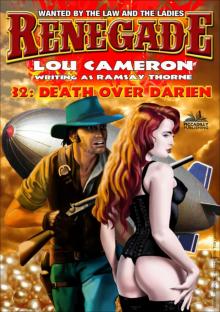 Renegade 32
Renegade 32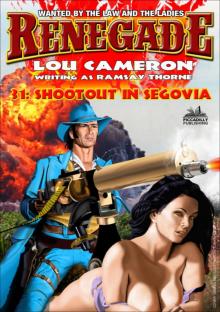 Renegade 31
Renegade 31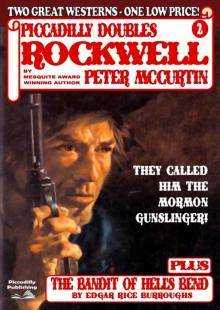 Piccadilly Doubles 2
Piccadilly Doubles 2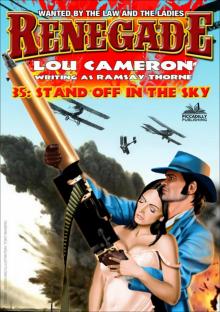 Renegade 35
Renegade 35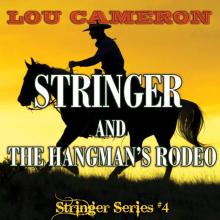 Stringer and the Hangman's Rodeo
Stringer and the Hangman's Rodeo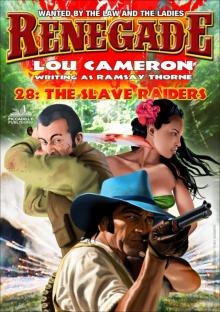 Renegade 28
Renegade 28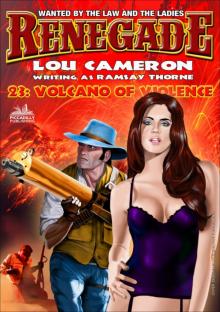 Renegade 23
Renegade 23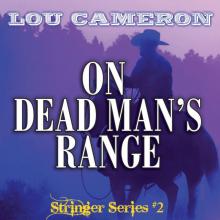 On Dead Man's Range
On Dead Man's Range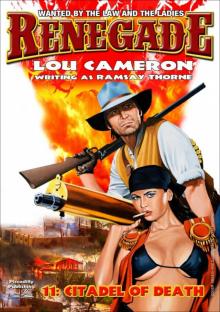 Citadel of Death (A Captain Gringo Western Book 11)
Citadel of Death (A Captain Gringo Western Book 11)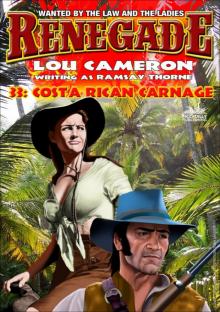 Renegade 33
Renegade 33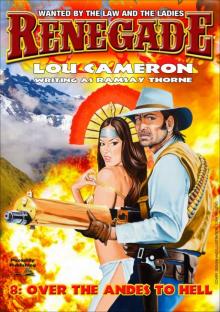 Over the Andes to Hell (A Captain Gringo Western Book 8)
Over the Andes to Hell (A Captain Gringo Western Book 8)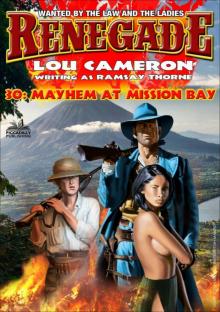 Renegade 30
Renegade 30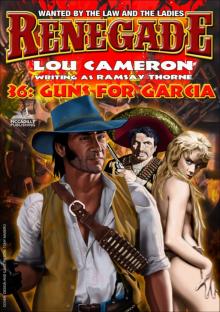 Renegade 36
Renegade 36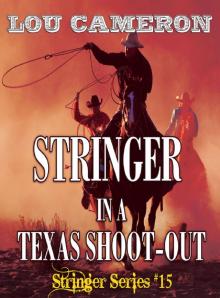 Stringer in a Texas Shoot-Out
Stringer in a Texas Shoot-Out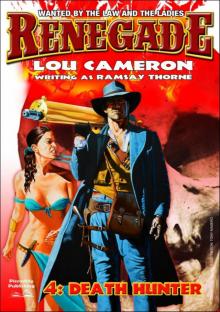 The Death Hunter
The Death Hunter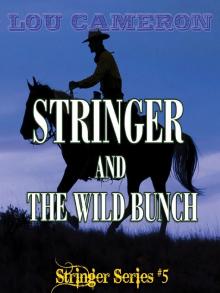 Stringer and the Wild Bunch
Stringer and the Wild Bunch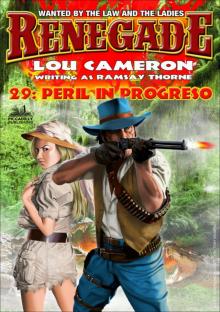 Renegade 29
Renegade 29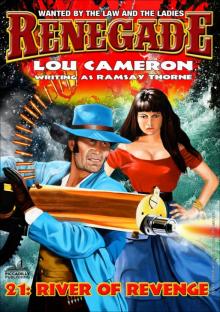 Renegade 21
Renegade 21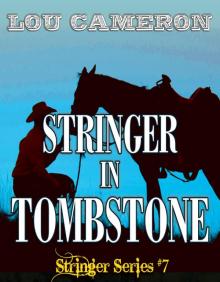 Stringer in Tombstone
Stringer in Tombstone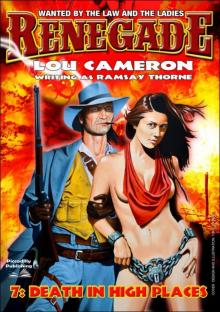 Death in High Places (A Renegade Western Book 7)
Death in High Places (A Renegade Western Book 7)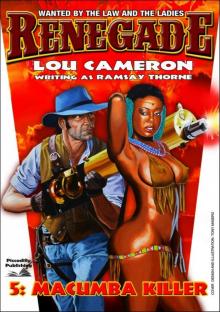 Macumba Killer
Macumba Killer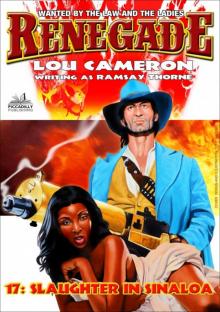 Renegade 17
Renegade 17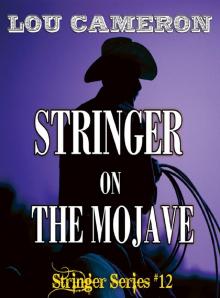 Stringer on the Mojave
Stringer on the Mojave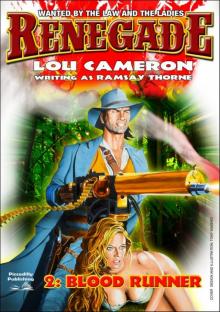 Blood Runner
Blood Runner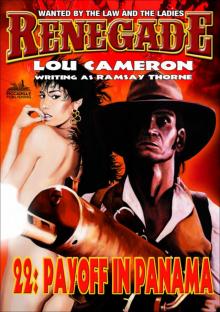 Renegade 22
Renegade 22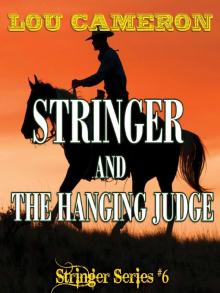 Stringer and the Hanging Judge
Stringer and the Hanging Judge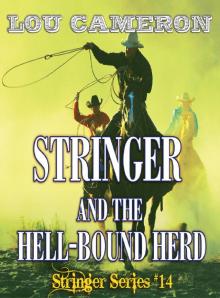 Stringer and the Hell-Bound Herd
Stringer and the Hell-Bound Herd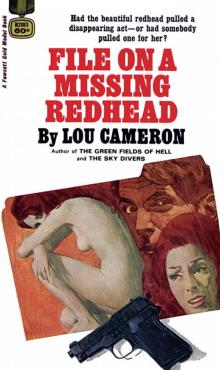 File on a Missing Redhead
File on a Missing Redhead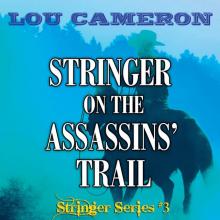 Stringer on the Assassins' Trail
Stringer on the Assassins' Trail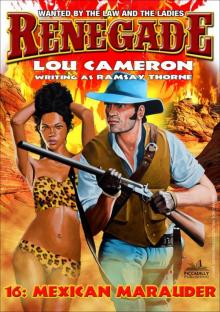 Mexican Marauder (A Captain Gringo Adventure #16)
Mexican Marauder (A Captain Gringo Adventure #16)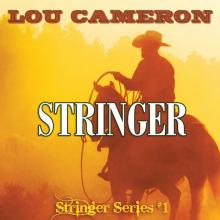 Stringer
Stringer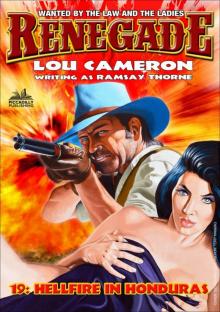 Renegade 19
Renegade 19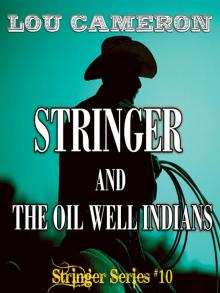 Stringer and the Oil Well Indians
Stringer and the Oil Well Indians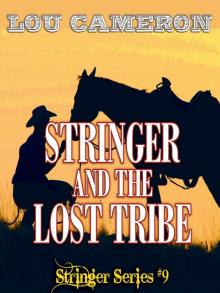 Stringer and the Lost Tribe
Stringer and the Lost Tribe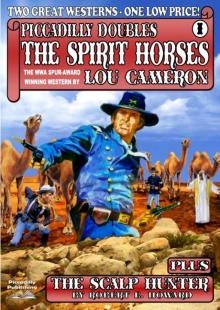 Piccadilly Doubles 1
Piccadilly Doubles 1 Stringer and the Border War
Stringer and the Border War Renegade
Renegade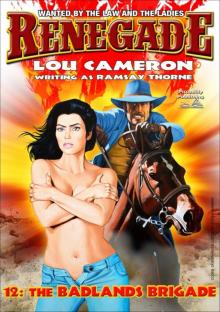 The Badlands Brigade (A Captain Gringo Adventure Book 12)
The Badlands Brigade (A Captain Gringo Adventure Book 12)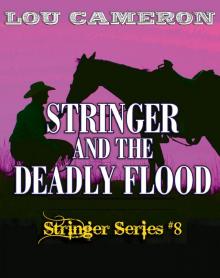 Stringer and the Deadly Flood
Stringer and the Deadly Flood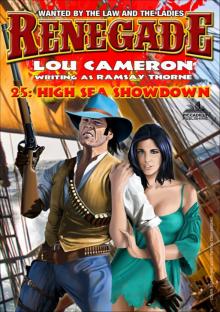 Renegade 25
Renegade 25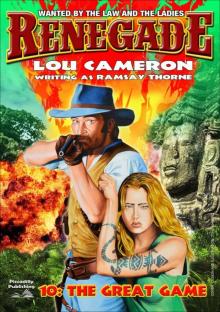 The Great Game (A Captain Gringo Western Book 10)
The Great Game (A Captain Gringo Western Book 10)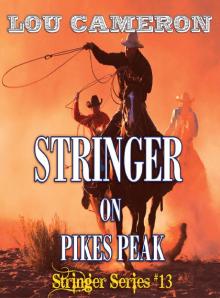 Stringer on Pikes Peak
Stringer on Pikes Peak